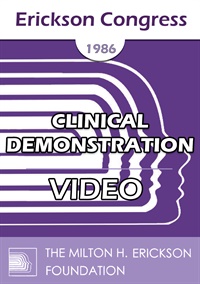
- Average Rating:
- Not yet rated
- Topic Areas:
- Short Courses | Therapeutic Relationship | Therapist Development
- Categories:
- Erickson Congress | Erickson Congress 2007
- Faculty:
- Robert Wubbolding, EdD
- Duration:
- 1:19:20
- Format:
- Audio Only
- Original Program Date:
- Dec 07, 2007
- Short Description:
- The daunting task of leading clients from a disempowering sense of external control to an actualizing sense of inner control becomes doable by helping them reframe their behavior from actions to language, i.e. seeing actions as an attempt to send a message or a signal to the world around them. This practical idea will be illustrated in role-play demonstrations of the WDEP system: Wants (or behavior as language), (self) Evaluation, and (action) Planning.
- Price:
- $15.00 - Base Price

- Average Rating:
- Not yet rated
- Topic Areas:
- Short Courses | Therapeutic Relationship | Therapist Development
- Categories:
- Erickson Congress | Erickson Congress 2007
- Faculty:
- Marcelo Alvarez Cordova, MD | Yolanda Aguirre-Gomez, MA
- Duration:
- 1:18:40
- Format:
- Audio Only
- Original Program Date:
- Dec 07, 2007
- Short Description:
- Switching from his/her digital to analog brain functions allows the therapist to get in deep touch with the client in order to be part of the system rather than to be an observer. This workshop will show how to improve this ability.
- Price:
- $15.00 - Base Price

- Average Rating:
- Not yet rated
- Topic Areas:
- Short Courses | Children and Adolescent Therapy | Humor | Therapeutic Relationship
- Categories:
- Erickson Congress | Erickson Congress 2007
- Faculty:
- Bruce L.M. Tanenbaum, MD
- Duration:
- 1:06:04
- Format:
- Audio Only
- Original Program Date:
- Dec 07, 2007
- Short Description:
- Underachieving adolescents present a significant challenge to the therapist. Traditional therapies are often slow and may be ineffective and frustrating both to the therapist and the client. Provocative Therapy is an active humor-based therapy that often elicits significant changes quickly. Case studies will help illustrate principles and techniques therapist can use with adolescents and other client who may present a challenge.
- Price:
- $15.00 - Base Price
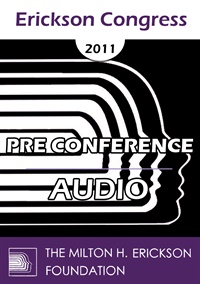
- Average Rating:
- Not yet rated
- Topic Areas:
- Hypnotherapy | Workshops | Pre-Conference Sessions | Generative Psychotherapy | Therapeutic Relationship
- Categories:
- Erickson Congress | Erickson Congress 2011
- Faculty:
- Stephen Gilligan, PhD
- Duration:
- 4:55:50
- Format:
- Audio Only
- Original Program Date:
- Dec 08, 2011
- Short Description:
- This workshop presents an integrative model for generative psychotherapy. The first part details how helpful therapeutic conversations traverse three core axes: (1) a time-line in which each significant life experience contributes towards a positive future; (2) a systemic dimension that integrates different “identity parts”; and (3) a hypnotic dimension that flows between conscious and unconscious processes.
- Price:
- $15.00 - Base Price
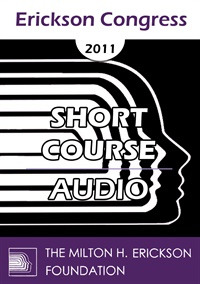
- Average Rating:
- Not yet rated
- Topic Areas:
- Short Courses | Resistance | Resources | Therapeutic Relationship | Therapist Development
- Categories:
- Erickson Congress | Erickson Congress 2011
- Faculty:
- Stan Stutzman, MA, LP
- Duration:
- 1:15:21
- Format:
- Audio Only
- Original Program Date:
- Dec 09, 2011
- Short Description:
- Consultation can be a valuable process in the provision of therapeutic services to clients. Traditional case presentation scenarios can lead to limited, reactive dialogues that solidify the therapist’s sense of “stuckness.” The reflecting team approach to consultation uses reflexive questioning to allow non-reactive associations free from the constraints of conversation thinking to access all of the participants’ inner resources. This workshop will explore the elements of meaningful consultation with discussion, video, and live demonstration.
- Price:
- $15.00 - Base Price
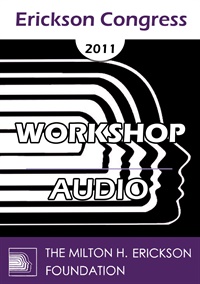
- Average Rating:
- Not yet rated
- Topic Areas:
- Workshops | Hypnosis | Therapeutic Relationship | Therapist Development | Trance | Unconscious Processes
- Categories:
- Erickson Congress | Erickson Congress 2011
- Faculty:
- Betty Alice Erickson, MS, LPC, LMFT
- Duration:
- 59 Minutes
- Format:
- Audio Only
- Original Program Date:
- Dec 07, 2011
- Short Description:
- Conversational Trances occur in virtually every good therapy session. Possessing phenomena of “regular” hypnosis, they speak powerfully both directly and indirectly to the unconscious. Often this opportunity is ignored. This workshop will show ways to create, use and become comfortable trusting both your and the client’s own abilities with this.
- Price:
- $20.00 - Base Price
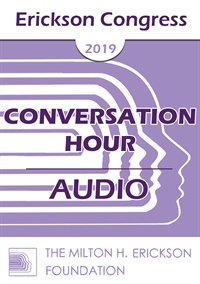
- Average Rating:
- Not yet rated
- Topic Areas:
- Conversation Hours | Therapist Development | Therapeutic Relationship
- Categories:
- Erickson Congress | Erickson Congress 2019
- Faculty:
- Scott Miller, PhD
- Duration:
- 1 Hour 2 Minutes
- Format:
- Audio Only
- Original Program Date:
- Dec 13, 2019
- Short Description:
- In this hour-long discussion, participants will have an opportunity to address questions regarding deliberate practice and their use of routine outcome measures in clinical practice.
- Price:
- $15.00 - Base Price
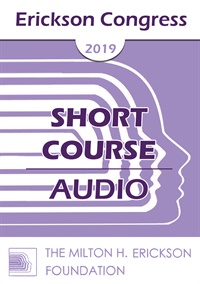
- Average Rating:
- Not yet rated
- Topic Areas:
- Short Courses | Therapeutic Relationship | Therapist Development | Trance | Resistance
- Categories:
- Erickson Congress | Erickson Congress 2019
- Faculty:
- Ilene Wolf, MA, LMFT
- Duration:
- 1 Hour 19 Minutes
- Format:
- Audio Only
- Original Program Date:
- Dec 12, 2019
- Short Description:
- This interactive workshop utilizes the group to teach and apply highly effective trance methods, combined with evidenced-based research from Stanford, and drama therapy action methods, (i.e. sociometric scaling, role reversal to increase empathy and the empty chair), to address clients’ unwillingness to give up defensiveness, blame and other relationship problems.
- Price:
- $15.00 - Base Price
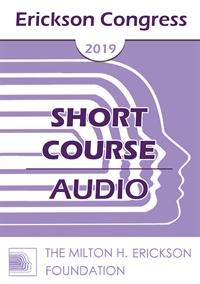
- Average Rating:
- Not yet rated
- Topic Areas:
- Short Courses | Art and Creativity | Hypnotherapy | Psychotherapy | Therapeutic Relationship | Therapist Development
- Categories:
- Erickson Congress | Erickson Congress 2019
- Faculty:
- Richard Hill, MBMSc, MEd, MA
- Duration:
- 1 Hour 30 Minutes
- Format:
- Audio Only
- Original Program Date:
- Dec 12, 2019
- Short Description:
- Hypnotherapy and psychotherapy have been developing over time through various phases. Directive therapies with an intervention orientation have shifted over the years to suggestive and client centered approaches. More recently both research and practice has opened our minds to relational and responsive approaches. The concept of “client responsiveness” is discussed in my book with Ernest Rossi, The Practitioner’s Guide to Mirroring Hands.
- Price:
- $15.00 - Base Price
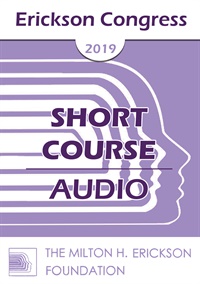
- Average Rating:
- Not yet rated
- Topic Areas:
- Short Courses | Depression | Trauma | Seeding | Therapeutic Relationship
- Categories:
- Erickson Congress | Erickson Congress 2019
- Faculty:
- Robert Wubbolding, EdD
- Duration:
- 1 Hour 24 Minutes
- Format:
- Audio Only
- Original Program Date:
- Dec 12, 2019
- Short Description:
- The American novelist William Faulkner stated, "The Past is never dead. In fact, it is not even past." This presentation emphasizes the unconventional use of reality therapy that connects the past with the presents by helping clients realize that their current behaviors are normal responses to abnormal situations that they have experienced. It also operationalizes the Ericksonian principle: "The solution often appears unrelated to the problem."
- Price:
- $15.00 - Base Price
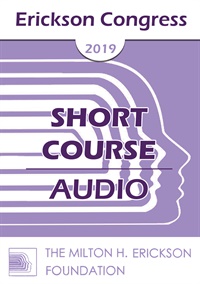
- Average Rating:
- Not yet rated
- Topic Areas:
- Short Courses | Pain and Healing | Therapeutic Relationship | Ericksonian Hypnosis and Therapy Techniques
- Categories:
- Erickson Congress | Erickson Congress 2019
- Faculty:
- Virgil Hayes, DO
- Duration:
- 1 Hour 27 Minutes
- Format:
- Audio Only
- Original Program Date:
- Dec 12, 2019
- Short Description:
- Chronic pain is frequently encountered by healthcare professionals. The current treatment is primarily pharmaceutical intervention with Opioids or NSAIDS that create new problems and address a limited part of the pain. Pain, whether physical or mental/emotional, tends to be experienced as one. Anticipated pain and memories of past painful incidents also contribute to the experience of pain.
- Price:
- $15.00 - Base Price
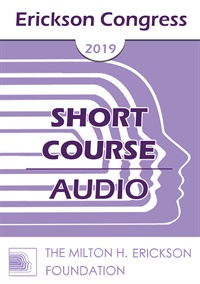
- Average Rating:
- Not yet rated
- Topic Areas:
- Short Courses | Relationships | Ericksonian Hypnosis and Therapy Techniques | Therapeutic Relationship
- Categories:
- Erickson Congress | Erickson Congress 2019
- Faculty:
- Kevin Hall, MSc
- Duration:
- 1 Hour 26 Minutes
- Format:
- Audio Only
- Original Program Date:
- Dec 12, 2019
- Short Description:
- Warmth is essential to life itself and we have therefore been attracted to it since the beginning of time. Conversely cold, the absence of warmth is associated with conditions of a more precarious nature such as scarcity, isolation or even demise. The association also seems to hold true for human relationships: people who are able to signify the concept of warmth in the way they relate to others appear socially competent, trustworthy and charismatic. The presence of warmth positively enhances attachment experiences and therefore moments of significant emotional connection.
- Price:
- $15.00 - Base Price
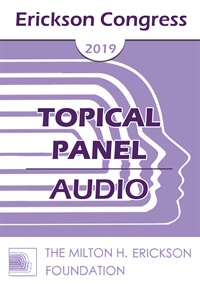
- Average Rating:
- Not yet rated
- Topic Areas:
- Workshops | Dissociation | Trauma | Hypnosis | Therapeutic Relationship
- Categories:
- Erickson Congress | Erickson Congress 2019
- Faculty:
- Camillo Loriedo, MD, PhD
- Duration:
- 1 Hour 54 Minutes
- Format:
- Audio Only
- Original Program Date:
- Dec 13, 2019
- Short Description:
- Dissociation can be described as the failure to integrate information and self-attributions that should ordinarily be integrated, and as alterations of consciousness characterized by a sense of detachment from the self and/or the environment. The strong connection between Hypnosis and Dissociation is known since the time of Pierre Janet's pioneer work. Dissociative hypnotic intervention demonstrated to be very useful in treating pain, anxiety disorders and many other conditions.
- Price:
- $15.00 - Base Price
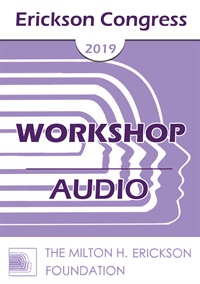
- Average Rating:
- Not yet rated
- Topic Areas:
- Workshops | Trauma | Therapeutic Relationship | Therapist Development
- Categories:
- Erickson Congress | Erickson Congress 2019
- Faculty:
- John Beahrs, MD
- Duration:
- 1 Hour 59 Minutes
- Format:
- Audio Only
- Original Program Date:
- Dec 15, 2019
- Short Description:
- Ratifying victimhood often paradoxically sensitizes to trauma’s effects, and is heavily reinforced socially. Therapists are challenged to help victims restore personal agency and accountability, without denying victimhood. Contracting for roles and boundaries precedes efforts to interdict traumatic re-enactment, redefine personal and social identity, access locus of control, and restore accountability.
- Price:
- $15.00 - Base Price
- Average Rating:
- Not yet rated
- Topic Areas:
- Clinical Demonstrations | Therapeutic Relationship | Therapist Development
- Categories:
- Erickson Congress 1986 | Erickson Congress
- Faculty:
- Jeffrey Zeig, PhD
- Course Levels:
- Master Degree or Higher in Health-Related Field
- Duration:
- 57:38
- Format:
- Audio and Video
- Original Program Date:
- Dec 05, 1986
- Short Description:
- IC86 Clinical Demonstration 01 - Enhancing Therapeutic Responsiveness - Jeffrey K. Zeig, Ph.D.
- Price:
- $29.00 - Base Price


